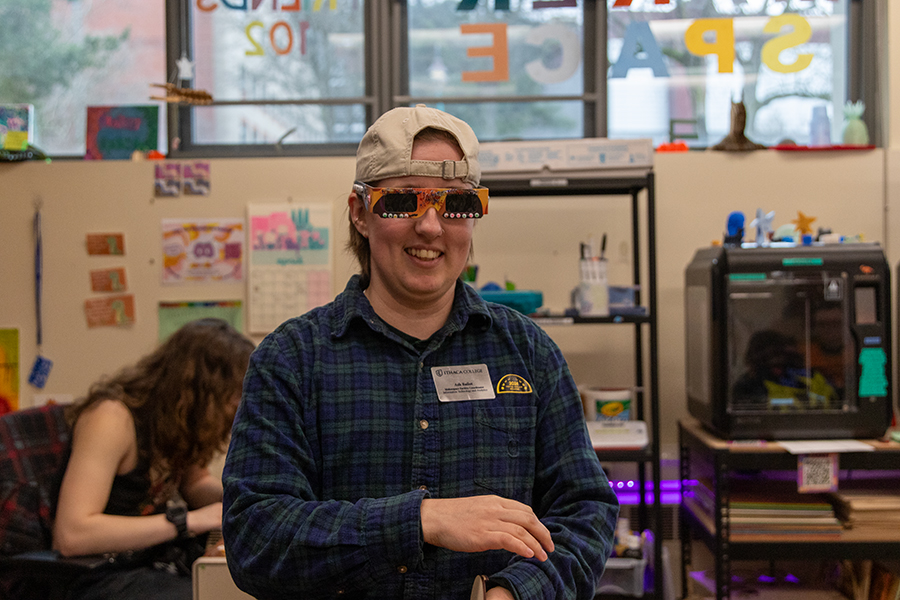Members of Ithaca College and greater Ithaca communities are turning their attention to the sky as they prepare for a total solar eclipse that will pass through Central New York on April 8. The last total solar eclipse in Central New York was in 1925.
According to NASA, a solar eclipse occurs when the moon travels between the Earth and the sun, which creates a shadow that can totally or partly block the sun’s light in some parts of the Earth. During a total solar eclipse, the moon’s shadow completely blocks the sun and the sky grows darker as it would during dawn or dusk.
Ithaca is not in the path of totality — the area where the moon completely blocks the sun and shows the corona, the sun’s outer atmosphere — but up to 99.2% of the sun’s surface will be blocked by the moon during the eclipse. Locations within 50 miles of Ithaca, including Geneva, Seneca Falls and Auburn, will be in the path of totality.
Samm Swarts, assistant director of Emergency Preparedness and Response in the Office of Public Safety and Emergency Management, said in a March 27 Intercom post that it is essential for people to wear solar glasses to view the eclipse because their eyes can sustain permanent damage without protection. Swarts said in the post that normal sunglasses will not protect people’s eyes, and they should use solar glasses with ISO certification while viewing eclipses.
Campus events
Senior Mikolaj Konieczny, prime minister of the IC Astronomy Club, said he and Audrey Sackey, a senior at Cornell University, applied to partner with NASA through the Eclipse Ambassadors Off the Path program in November 2023. Through the program, an undergraduate student and an amateur astronomer team up to complete an online eclipse training and then educate and distribute solar glasses in underserved communities.
Konieczny said the IC Astronomy Club received 300 solar glasses from NASA and 150 solar glasses from the Sigma Pi Sigma, an honor society for physics and astronomy students, to distribute to the campus community. The club will table from 4–6 p.m. April 5 in IC Square to hand out glasses and share resources about eclipse safety.
Konieczny said the IC Astronomy Club will also go to Longview Retirement Community to teach residents about the eclipse and share solar glasses.
“Partnering with NASA … is great because it brings our communities together in this sort of admiration at the wonders of the cosmos,” Konieczny said. “I think that every person, no matter their orientation, race or background, will be able to enjoy this very human experience of just being shocked at this eclipse.”
Konieczny said the IC Astronomy Club has organized a roundtrip bus ride to Cayuga Lake State Park in Seneca Falls, which is in the path of totality, to watch the eclipse. The Student Governance Council provided $938 and the Department of Physics and Astronomy provided $150 to cover the cost of the bus so it is free for campus community members
Konieczny said he thinks the eclipse has generated more interest in the IC Astronomy Club which he hopes will encourage curiosity about astronomy.
“Publicity is great because more people learn about stars, more people learn about astronomy, and more people actually look up and appreciate … the things that we as humans have seen and observed for thousands of years,” Konieczny said.
Luke Keller, a professor in the Department of Physics and Astronomy, created a page on the department website with information and recommendations for the eclipse. Keller said the eclipse will be a spectacular event because it happens so infrequently in any given location, and shows parts of the solar system that usually are not visible from Earth.
“If [people] go to where it’s total, the cool thing about that is you can see stars,” Keller said. “The sky will be completely dark like nighttime. You’ll actually see streaks coming out from the sun because it actually has an atmosphere that extends out, but we don’t see it during the day. But then you’ll see stars and some of the brightest stars near the sun are the planets, so they’ll be lined up so you can really get an idea of what the solar system looks like in a way that isn’t usually possible.”
Community preparations
Rob Montana, communications manager of Visit Ithaca, said the group hopes that eclipse enthusiasts will stay in Ithaca hotels and travel to the path of totality.
“We think that Ithaca is in a really unique position because not just Rochester area, but also Syracuse and Buffalo, will be experiencing total eclipse — the path of totality goes through all three of those places,” Montana said. “We’re so close to all of them that it really makes Ithaca a natural place to stop, spend the night and then drive up that day.”
Montana said Visit Ithaca has worked with several local businesses and organizations to plan or promote events for the eclipse. He said Visit Ithaca is chartering a bus to Fair Haven for people to view the eclipse.
Community Reaction
Zoë Van Nostrand, marketing and community engagement coordinator for the History Center in Tompkins County, said astronomical events like solar eclipses have been significant to people throughout history, including indigenous people in the Haudenosaunee Confederacy who lived in New York state up to 13,000 years ago. She said eclipses link today’s people to people of the past.
“One of the things that’s really unique about astronomical phenomena is that the experience itself hasn’t changed,” Van Norstrand said. “It’s not something that is specific to any one culture or any one people. Every culture in the world has got to experience an eclipse.”
Van Nostrand said the History Center plans to share newspaper excerpts about past partial and total eclipses in Tompkins County from their digitized records on Instagram and Facebook.
“One of the things that I think is particularly powerful when reading these older newspaper articles about eclipses is that we are able to answer some of the questions that were asked decades ago, and that we now have answers of them due to the scientific study of experts in the field,” Van Nostrand said.
Keller said he likes that the eclipse encourages people to become curious about the solar system and have conversations about astronomy.
“There’s never a crowd of people no matter where they are on the planet that doesn’t cheer when [the eclipse] happens,” Keller said. “Everybody knows exactly what’s going to happen, and nowadays, we know when it’s gonna happen to the second and they just still just go bananas. … So it’s also kind of a social event. And I think enjoying that is as important, I think, as the actual event.





















